Death Sentence of Sunni Iranian Cleric Commuted to Life Imprisonment
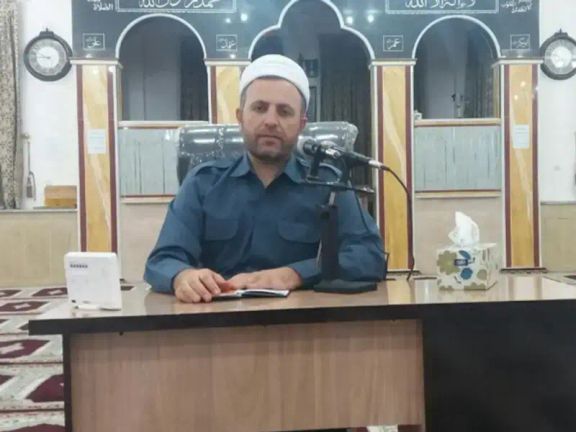
After interventions from Sunni clerics, the death sentence for Mohammad Khezrnejad, a dissident Sunni Kurdish cleric has been commuted to life imprisonment.

After interventions from Sunni clerics, the death sentence for Mohammad Khezrnejad, a dissident Sunni Kurdish cleric has been commuted to life imprisonment.
Khezrnejad, a vocal critic of governmental policies, was initially detained on November 19, 2022, following his speech at a memorial for Asad Rahimi, a victim of the protests in Bukan, where he openly criticized the government's suppression of protests following the death in morality police custody of Mahsa Amini. The death of the Kurdish-Iranian was the trigger for the biggest anti-government uprising since the founding of the Islamic Republic.
The Urmia Revolutionary Court, after holding Khezrnejad in temporary custody for over a year, convicted him on December 20, 2023, for "corruption on earth," sentencing him to death. Additional charges included 15 years for "damaging the integrity or independence of the country," and one year for "propaganda against the system." The sentences were later affirmed by Branch 41 of the Supreme Court, presided over by Judge Ali Razini.
Mizan, Iran's judicial news agency, claims a displayed remorse and pledge for better conduct from Khezrnejad, alongside pleas from prominent Sunni scholars, led to the reduction of his sentence to life imprisonment.
During his detention, reports from the Hengaw Human Rights Organization highlighted that Khezrnejad endured severe torture, resulting in coerced confessions.
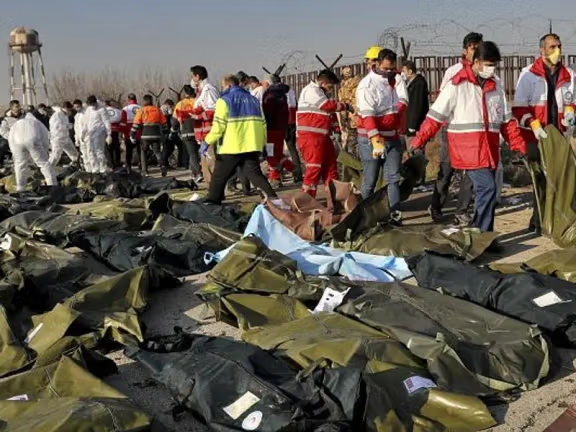
A court in Ontario has found that Ukraine International Airlines failed in its duty to cancel flight PS752 in 2020 that took off from Tehran amid military activity and was downed by the IRGC killing 176.
This judgment does not absolve the IRGC from responsibility in the downing of the aircraft. The Ontario Superior Court of Justice earlier labeled the missile strike by the IRGC as "terrorist activity" and dismissed claims by Iran that the downing was a mere "human error."
The judgement on Monday found, that despite the IRGC's deliberate firing of two missiles at the airliner, the company could not prove that it acted according to standards to cancel the flight amid potential military activities in the early hours of January 8, 2020.
“I declare that the defendant has failed to prove, on a balance of probabilities ... that the plaintiffs’ damage was not due to the negligence or other wrongful act or omission of the carrier or its servants or agents; or that such damage was solely due to the negligence or other wrongful act or omission of a third party,” said Justice Jasmine Akbarali on Monday.
Legal expert Paul Miller commented on the verdict, stating, "This verdict sends a strong message to international airlines that passenger safety must always be their top priority. Airlines must take proper measures to avoid operating in conflict zones.”
The judgment now means that under the Montreal Convention, UIA cannot limit compensation to $180,000 USD per passenger but must pay full compensatory damages for the fatalities, a small victory for the families of victims who are still seeking justice for Iran's act of shooting down the plane.
Iran failed to close its airspace during the hours when it launched the attack and was expecting a US retaliation. Later, when it was proven the airliner was downed by two IRGC missiles, Iranian officials argued that it was human error due to the tense situation prevailing in the aftermath of the attack on US bases.
The incident claimed the lives of 176 people, including 63 Canadians, 10 Swedes, and 82 Iranians. Flight PS752 was hit by two IRGC air-defense missiles shortly after departing from Tehran's Imam Khomeini International Airport.
When it was proven the airliner was downed by two IRGC missiles, Iranian officials argued that it was human error. They have also prevented an independent investigation of the incident and disclosing full details. For three days after the incident, they hid the fact that the plane was shot down, insisting that the crash was an accident.
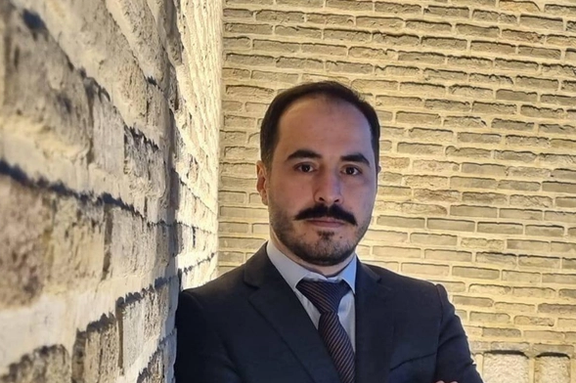
Former political prisoner Hossein Ronaghi has alleged that security forces threatened him with sexual assault and confiscated his belongings while he was traveling from Tabriz to Tehran on Sunday.
In a social media post on Monday, the activist described the incident: “What stood out for me was the public threat of rape by a young man in plain clothes at the Tabriz airport, along with the deputy prosecutor of Tabriz breaking the law and stealing my belongings!”
As he described on X, the national emblems of the Lion, Sun, and "Woman, Life, Freedom" movement caught the attention of agents, who ridiculed him. Woman, Life, Freedom became the slogan for the nationwide protest in Iran in 2022 following the death of Mahsa Amini in police custody. Over 550 protesters were killed during the uprising.
Ronaghi had to flee his home in September 2022 as security agents raided his home while he was speaking with Iran International about unfolding protests.
The blogger was waiting to board the flight in the transit lounge when officers of the Islamic Revolutionary Guard Corps (IRGC) approached him and told him they need to ask questions and inspect his bag one more time. He was then interrogated, and his belongings were searched.
The agents told him he could not leave unless he surrendered all his belongings, claiming that the deputy prosecutor of Tabriz had ordered the confiscation of his mobile phone, laptop, electronic devices, and identity documents.
Describing the conversation he had with one of the agents, Ronaghi wrote: “Suddenly, in a harsh tone, he threatened to rape me, saying: ‘It's a pity that Islam has tied my hands. Otherwise, I would have shown you what it means to suffer (as a result of rape)!
Ronaghi wrote he replied to the plainclothesman: Do you think these threats scare us? Or does it compel us to be silent? No one is afraid of you anymore!" Ronaghi wrote on X.
Ronaghi's brief detention at the airport and confiscation of his belongings could be part of regime actions to intimidate dissidents during the tightly controlled presidential election on June 28. He is a well-know dissident and has published opinion articles in Western media.
In the past decade, the dissident activist has been arrested several times and has staged hunger strikes in prison. He was first arrested, along with his brother Hassan, in the aftermath of the disputed presidential elections in 2009 for assisting journalists and political activists to circumvent internet censorship. In addition, he was charged with insulting the Supreme Leader Ali Khamenei in his blog posts.
His most recent arrest was in September 2022 during the Woman, Life Freedom protests. He was detained along with his lawyers in front of the Evin Prison prosecutor's office and subsequently tortured. In protest, he went on a hunger strike. Iranian authorities later released Ronaghi on bail.
According to human rights sources, previous rounds of torture had resulted in him losing one kidney, with his remaining kidney functioning at only 60 percent.
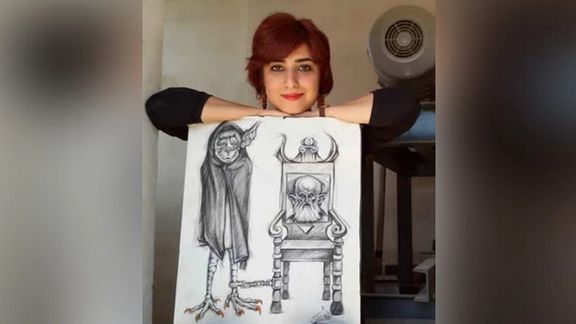
The Revolutionary Court of Tehran has handed down a six-year prison sentence to Atena Farghadani, a cartoonist targeted for her critique of the government.
According to her attorney, Mohammad Moqimi, Farghadani has been behind bars since her arrest on April 13, charged with “insulting sacred values and propagating against the ruling system". Farghadani received five years for the former and an additional year for the latter. Moqimi blasted the proceedings as a "sham trial" in a post on the X, denouncing the judiciary's manipulation of charges to secure the harshest possible sentence.
Farghadani came to a head when she was seized by security forces while attempting to display her artwork on a street wall outside Supreme Leader Ali Khamenei’s compound in response to the suppression of her art exhibition and the continuous harassment by security personnel.
Post-arrest, she was subjected to torture in a Revolutionary Guard-operated safe house, before being transferred to Evin prison.
Her imprisonment has drawn criticism from global human rights entities, including PEN America, Cartooning for Peace, and the Cartoonists Rights Network International, which have collectively decried her arrest and the punitive actions against her, urging for her immediate release.
The crackdown on artists has worsened since the 2022 uprising with some even receiving the death penalty, as seen in the recent case of Toomaj Salehi, a dissident rapper who is now on death row.
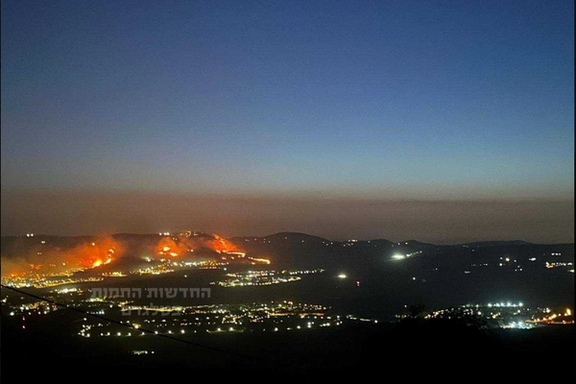
Northern Israeli residents who face daily attacks from Iran-backed Hezbollah say their lives have turned into "hell", and view the Islamic Republic of Iran as responsible.
Hezbollah launched anti-aircraft missiles at Israeli fighter jets over southern Lebanon on Sunday, according to the Israel Defense Forces (IDF), as cross-border skirmishes between Israel and the Iran-backed terror organization intensify.
Incoming rocket alerts were also activated in the northern coastal region of Acre overnight Monday, the IDF said in a statement.
The drones and anti-tank missiles launched caused fires and damaged buildings in northern Israel. This came just a week after Hezbollah rockets sparked days of wildfires in northern Israel, with a forest reserve destroyed and at least 11 people hospitalized for smoke inhalation.
Since October 7, clashes between Israel and Lebanon have escalated, with 150,000 people on both sides of the boundary forced to flee their homes. Recent attacks have increased the fears of full-scale war.
For Northerners in Israel, everyday life is a battle, Israeli resident Ofri Eliyahu Rimoni told Iran International. "Life is a living hell' for people of the North," she told Iran International.
"Alarms four or five times a day, telling us to go to shelters to stay there. A lot of people was displaced from their homes and the people who didn't get displaced from their homes, they are right now living in a war zone. Literally a war zone," she said.
She said agriculture is the main industry in the region and the wildfires set off by Hezbollah attacks are devastating the local economy as people risk their lives just to work in the fields.
"Your whole life burning down. It's burning my heart," said Rimoni.
Israeli Prime Minister Benjamin Netanyahu threatened further military action after the onslaught of Hezbollah attacks in the North.
While touring the damage from the fires in the northern city of Kiryat Shmona last week, Netanyahu said that Israel was preparing for “very intense action in the north.”
“One way or another, we will restore security to the north,” Netanyahu said.
60,000 people, who previously called the North their home, are living in hotel rooms scattered across Israel.
On June 5, at least 11 people from a Druze Arab village of Hurfeish in northern Israel were injured after Hezbollah launched an armed drone attack. One person was reportedly in critical condition after the exploding drones crashed into a soccer field. 39-year-old First Sergeant (res.) Refael Kauders was killed.
On Telegram, Hezbollah took credit for the attack, claiming the attack was in response to an Israeli strike on June 4 that killed a Hezbollah operative in the southern Lebanese town of Naqoura.
Mufid Mari, a former Knesset member and retired IDF Colonel is from the Druze village of Hurfeish that was hit. He said life is not normal, with tourism at a standstill in the north and the Hezbollah attacks impacting factories and day-to-day life.
Mari said Druze villages are especially vulnerable to Hezbollah attacks because 40 percent of their homes are old and are not equipped with safe houses to protect them against rockets. When the sirens sound, the goal is to move as quickly as possible, in a matter of seconds, to the safe room.
"All of us in the Middle East, we want and need to be living in peace," said Mari.
Mari said the daily attacks are intolerable and he believes they need to get ready for a large-scale war with the Iran-backed proxy.
Israeli security expert Sarit Zehavi said Northerners in Israel are expecting a Hamas-style attack in the region. Zehavi said more than a decade ago, Hezbollah published its offensive plan for an attack on Israel - and she described its similarity to what Hamas did to southern Israel as “astonishing.”
The anticipated attack hasn't happened yet, she believes, because tens of thousands of residents have already evacuated. She said most of the attacks are in evacuated areas, but in the recent weeks there were more attacks on areas which are further from the border with Lebanon.
"These are exactly the areas that the UAVs and the anti-tank in the rockets aim to and this is every day," said Zehavi.
Zehavi, who served 15 years as an intelligence officer in the IDF said "the evacuated towns have no prospect when they will be able to come home. They just don't know how this is going to play out. And it's so sad to see the beautiful valley empty like this."
Zehavi said all roads lead to Iran.
The founder of the Alma Research Center which monitors and disseminates information on the threats faced in the North, referred to Iran as the 'engineer' and the 'architect' behind everything happening.
"This is all part of the same campaign under the title 'unification of fronts.' The idea of unification of fronts is to create a multi-front campaign against the State of Israel by these proxies."
It is widely believed that Iran supports Hamas with $1 billion a year. The Islamic Republic also supports Palestinian Islamic Jihad with tens of millions and is providing Hezbollah with 70 per cent of its budget - and its ideology.
Hezbollah opened a battle front with Israel on Oct. 8, a day after the deadly Hamas attacks in Israel.
While the US and France have been trying to find a diplomatic solution to the conflict, Northerners in Israel say they just want to have their lives back.
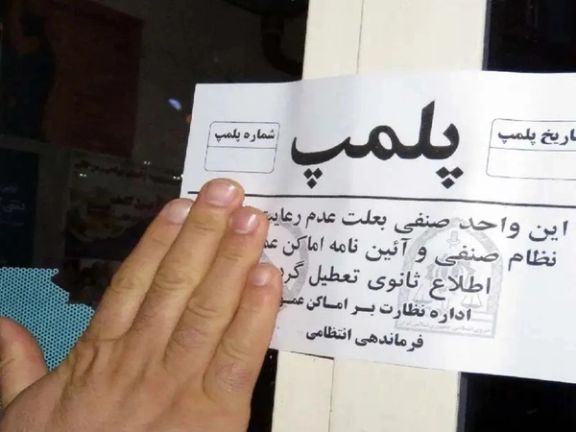
Iranian law enforcement agencies have recently widened their crackdown on cafes secretly serving alcohol to customers, with two cafes in Tehran province sealed by authorities in the last week.
State-affiliated media quoted Amir Ahmadi, the Public Prosecutor of Baharestan County, in Tehran province, announcing that two cafes were sealed after being identified for serving alcoholic beverages.
Selling, possession and drinking alcohol by Muslims was prohibited in Iran after the establishment of the Islamic Republic in 1979. During the monarchy alcoholic beverages were unrestricted, subject to certain regulations.
IRGC-affiliated Tasnim News Agency on Sunday quoted Ahmadi as saying, "A cafe in the city of Salehieh that served alcoholic beverages at the premises was sealed. The cafe owner and two of the customers of the cafe were arrested."
Ahmadi further stated that arrests were made in addition to the cafe being sealed.
“The operator of the cafe and two of the customers were arrested,” he added.
He also warned that all cafes in Baharestan County are being closely "monitored" and "must comply with Sharia law."
"We will not allow alcohol to be served in public places and cafes in the city under any circumstances," Ahmadi stated. "If we find any violations, decisive action will be taken against the operators, as demonstrated by the recent closures of cafes for serving alcohol."
The increased crackdown on alcohol consumption coincides with government efforts to enforce hijab rules
Additionally, on May 15, Asghar Jahangir, Iran’s judiciary spokesperson announced the arrest of a garden owner accused of producing homemade alcohol that poisoned some people. The garden was subsequently sealed, according to Entekhab News.
He added that 24 people were present at this gathering of which 6 were poisoned and 1 died as a result of consuming counterfeit alcohol.
Moreover, last year in July, Mohammad Yousefvand the Public and Revolutionary Prosecutor of Robat Karim County, Tehran Province, announced that five cafes had been sealed and four individuals were arrested. Yousefvand further stated that 6 individuals were killed as a result of consuming bootleg alcohol, and 22 people were poisoned in Robat Karim.
Individuals who breach the ban on alcohol are punished with lashings and monetary penalties. For those who distribute alcohol, the penalties are even higher with the possibility of capital punishment. In September last year, four men were sentenced to death for their involvement in counterfeit alcohol distribution which allegedly led to the death of 17 individuals.
Despite the ban and the recent heightened crackdown by authorities on cafes, shops, parties, and gatherings where alcohol is served or sold, Iranians continue to consume alcohol.
A survey by Iran Open Data in 2021 found that half of all adults in Iran regularly drink alcohol with homemade alcohol being the preferred choice.
Furthermore, a survey by World Health Organization in 2018, placed Iran in the 9th ranked among 189 countries for alcohol consumption per capita.
With bootleg alcohol consumption on the rise in Iran, some critics believe that hardliners are involved in widespread alcohol poisoning as they believe those who consume alcohol must be punished.
Nevertheless, with alcohol consumption unregulated and prohibited, Iranians lack safety measures for responsible drinking, leaving them vulnerable to the dangers of counterfeit alcohol which include poisoning, blindness, and death.